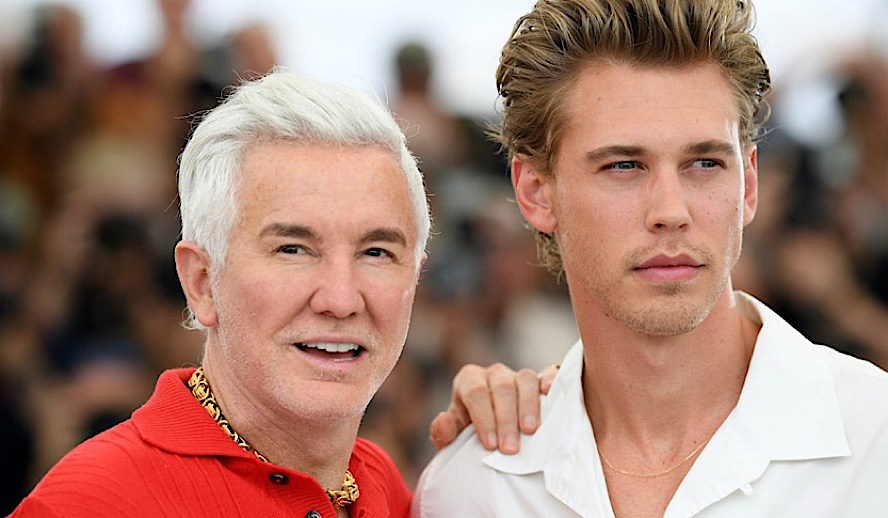Table of Contents
Video Verison of this Article
Photo: Baz Luhrmann/Shutterstock
A Flair for the Dramatic
Baz Luhrmann’s films adhere more closely to the conventions of Ancient Greek or Brechtian Theatre than to modern tastes for realism. Luhrmann frames his spectacular stories in such a way that the audience is constantly aware that they’re watching a show. In fact, most of his films concern themselves with performance and showmanship, often containing shows within the show.
Things to do:
- Subscribe to The Hollywood Insider’s YouTube Channel, by clicking here.
- Limited Time Offer – FREE Subscription to The Hollywood Insider
- Click here to read more on The Hollywood Insider’s vision, values and mission statement here – Media has the responsibility to better our world – The Hollywood Insider fully focuses on substance and meaningful entertainment, against gossip and scandal, by combining entertainment, education, and philanthropy.
Luhrmann is an auteur, but not in a sense that’s easy to define. His style is not marked by signposts or signature shots like Wes Anderson’s title cards or Spike Lee’s dolly rides. He does, however, have a distinct touch and there are certain common threads between his films that make them easily recognizable as his work. For example, his soundtracks are blends of music from different eras, there are usually more than a few dreamlike montage sequences, and all of his films are polished and ornate to the point of being decadent.
2 Hours ‘Elvis’ Secrets, Interviews, Premiere & Behind the Scenes | Austin Butler, Baz Luhrmann
Come Behind The Scenes of ‘Elvis’
One phrase that commonly gets repeated in descriptions of Luhrmann’s films is “over the top.” He crafts unrestrained visual collages that ride the line between being kitschy and euphoric, which prevents his films from having universal appeal, but when his over-the-top style hits its mark, it makes for true movie magic.
Baz Luhrmann – La Bohème
The closest thing to an auteur’s signature Luhrmann uses is the mantra “Truth. Beauty. Freedom. Love.” The motto for the bohemians in ‘Moulin Rouge!’ seems also to be the ethic of every leading character in Luhrmann’s films. The words even made a visual reappearance in the opening of Luhrmann’s most recent film: ‘Elvis.’ From ‘Strictly Ballroom’ to the nearly three-hour epic ‘Australia,’ something of the bohemian spirit prevails in Luhrmann’s movies.
Related video: Come Behind The Scenes of ‘Elvis’ | Austin Butler, Tom Hanks and Baz Luhrmann
Related video: Full Rendezvous at the World Premiere of ‘Thor: Love and Thunder’ | Chris Hemsworth, Natalie Portman
Related video: Full Commentary – Cast & Crew Spills Secrets on Making of ‘Thor: Love and Thunder’ | In-Depth Scoop
This is most obvious in the films that are explicitly about artists. ‘Strictly Ballroom’ follows Scott (Paul Mercurio), a professional dancer, and Fran (Tara Morice), the woman he teaches to be his dance partner. Scott teaches Fran to follow her own heartbeat to find her rhythm. The pair prove their love to Scott’s parents, as well as the merit in their unconventional style of dance, through a breathtaking dance routine. The story drips with romance and idealism.
Similarly, ‘Moulin Rouge!’ tells the love story of aspiring writer Christian (Ewan McGregor) and the courtesan Satine (Nicole Kidman). This tale of forbidden love takes place in the heart of Bohemian Paris, the namesake of Puccini’s La Bohème (of which Luhrmann directed a stage adaptation). The ideals of Truth, Beauty, Freedom, and Love are opposed by the transactional nature of prostitution represented by the Duke (Richard Roxburgh), which results in the sort of beautiful tragedy that romantic types relish.
Luhrmann’s most recent film, a dizzying reflection on the life of Elvis and the iconography of the 50s, 60s, and 70s, paints the musical icon as a quixotic superhero. The most effective and transporting scenes are those when Elvis (Austin Butler) performs, and the music transforms the entire world. This all-consuming energy and its commercialization by Colonel Tom Parker (Tom Hanks) reflects the seedy, tragically beautiful world of Bohemian Paris as portrayed in ‘Moulin Rouge!’
Full Commentary – Cast & Crew Spills Secrets on Making of ‘Elvis’
Related Video: Full Commentary on ‘Top Gun: Maverick’: Tom Cruise, Val Kilmer, Jennifer Connelly, Miles Teller
Related video: ‘Top Gun: Maverick’ Full Premiere Reactions: Tom Cruise, Val Kilmer, Jennifer Connelly, Miles Teller
Related video: EVOLUTION: Every Tom Cruise Role From 1981 to 2021, All Performances Exceptionally Poignant
These three films are sensual and rich, romantic to their core, and, by my estimation, Luhrmann’s best. It takes an idealist’s eye to portray Paris in the early 20th century or the mythical persona of Elvis Presley. Telling a realistic, gritty story about either of those subjects would somehow miss the psychological mark. There are things that hold transcendent meaning, and Luhrmann deals with them as they live in our minds because it’s somehow more truthful to do so than to recreate the objective truth. ‘Strictly Ballroom’ does the same with ballroom dancing, heightening the drama that already exists in the competitive dance world with unironic flair.
Anachronistic Adaptations
Though Romeo, Juliet, and Jay Gatsby are not bohemian artists, these characters are romantic in the same way, wrapped up in high ideals and pursuing something just out of reach. One of Luhrmann’s most recognizable directorial practices is the inclusion of both modern music and music that’s contemporaneous with his movies’ settings. It’s thrown into particularly sharp relief in his adaptations.
Related article: EVOLUTION: Every Henry Cavill Role From 2001 to 2021, All Performances Exceptionally Poignant
Related article: EVOLUTION: Every Chris Evans Role From 1997 to 2020, All Performances Exceptionally Poignant
Related article: #metoo Revolution: Powerful Questions That Need Answers
Related article: FACT-CHECKED Series: Timothee Chalamet and 32 Facts about The Young Superstar
‘William Shakespeare’s Romeo + Juliet’ sees the classic story retold in modern Miami, but featuring costuming that’s heavily influenced by Elizabethan Theatre, and a musical mix of hip-hop, prog rock, and pop. ‘The Great Gatsby,’ meanwhile, shows a dazzlingly bright version of 1920s America. Some of the shots in the film are framed with art deco metalwork, and some of F. Scott Fitzgerald’s words appear on the screen before wafting away. Its soundtrack, too, features a mélange of genres.
Neither the heightened realities nor the blended soundtracks are unique to Luhrmann’s adapted films, but in the adaptations, it makes his artistic goals far more explicit. His versions of Romeo and Juliet and The Great Gatsby attempt to capture the timeless, romantic heart of those stories. Luhrmann tracks the connections between then and now, bringing closer to home the motivations of nearly unbelievable characters.
Full Rendezvous At the Premiere of ‘Elvis’ with Reactions from Stars
His anachronistic stylings also heighten the feeling that we, the audience, are attending a show. We are simultaneously pulled into the sweep of the story and reminded that it has been packaged and delivered for our entertainment. This is, I think, one of the dynamics that make Luhrmann’s films so divisive. It’s a somewhat obvious conceit, and yet no one else pulls it off with such gusto.
Related article: MUST WATCH – The Hollywood Insider’s CEO Pritan Ambroase’s Love Letter to Black Lives Matter – VIDEO
Opulence Can Be Exhausting
What makes Luhrmann’s films so compelling can also be what makes them headache-inducing. He matches larger-than-life subject matter with larger-than-life tricks of editing, including swirling, sweeping dolly shots, blurred close-ups immediately followed by still snapshots, or even, in the case of ‘Elvis,’ a blackout by way of a shrinking point of light becoming so small you have to squint to see it. That last example is perhaps the best to illustrate what I mean.
At the end of ‘Elvis,’ I watched the blackout in awe. I didn’t want the spirit of Elvis to leave the theater. And yet, I had a headache by the time the movie was over, worsened by squinting at that pinprick of light. The same thing has happened with ‘Moulin Rouge!’ each of the dozens of times I’ve seen it. There are other filmmakers who bring me to the edge of my seat without the subsequent need for Advil, but there is something sublime in the sheer opulence of Baz Luhrmann’s films. He manages to capture the soaring sensation you feel when you dance to your favorite music or arrive at a travel destination, as well as the excitement of seeing something you’re not supposed to.
Related article: The Hollywood Insider’s CEO Pritan Ambroase: “The Importance of Venice Film Festival as the Protector of Cinema”
Related article: The Masters of Cinema Archives: The Hollywood Insider Pays Tribute to ‘La Vie En Rose’, Exclusive Interview with Director Olivier Dahan
Related article: – Want GUARANTEED SUCCESS? Remove these ten words from your vocabulary| Transform your life INSTANTLY
‘Australia’: The Odd One Out
A fixation on opulence and romance makes Luhrmann a singularly qualified candidate to take on subjects like Romeo and Juliet or Elvis Presley, but what happens when he’s given the entirety of Australia to work with?
Luhrmann’s campy epic is a romance fit for Hollywood’s Golden Age between the refined Lady Ashley (Nicole Kidman) and the wily, brutish “Drover” (Hugh Jackman). Their trek through the Australian outback is guided by the mystical influence of King George (David Gulpilil), the Aboriginal grandfather to Nullah (Brandon Walters), a mixed-race child being tracked down by the vengeful Neil Fletcher (David Wenham). Epic in scale, but still executed with Luhrmann’s over-the-top sensibilities, ‘Australia’ reads a little differently than his other films.
Whereas the elephant in ‘Moulin Rouge!’ and the abandoned proscenium arch on the beach in ‘William Shakespeare’s Romeo + Juliet’ allude to larger bodies of shared knowledge between the audience and the director, the symbolism in ‘Australia’ is self-contained. The relationship between the romantic leads and Nullah, for example, reads as an allegory for Australians of European descent and Aboriginal Australians learning to overcome their differences and doesn’t rely so much on imagery from our collective subconscious. Rather than being riddled with cultural references in service of a new vision, ‘Australia’ is a pastiche of an older style of filmmaking leaning towards the melodramatic. The symbolism can be picked apart on its own terms, and it somehow feels less impactful and more cliché.
Related article: A Tribute to Johnny Depp: The Actor and Musician Who Defined Range
Related video: EVOLUTION: Every Johnny Depp Role From 1984 to 2020, All Performances Exceptionally Poignant
Related article: A Tribute to the Hero & President Volodymyr Zelenskyy: Comedian/Actor, Ukraine’s President and Heroic Leader
Bazmark: The Odd One In
Born Mark Anthony, Bazmark Luhrmann earned the nickname “Baz” in high school and later changed his name by deed, combining his names into one. Luhrmann has repeated in a good number of interviews that he grew up in a small town, entranced by the silver screen. Perhaps his love affair with stories being told from across the Pacific Ocean in Hollywood is what made him into such a distinct personality, and subsequently a director like no other in the business.
Regardless of how you feel about Luhrmann’s films, there is something so passionate and alive in them that it’s hard to deny their significance. As movies and television become more and more cynical and true-to-life, Luhrmann’s films stand out as bastions of unapologetic Romanticism.
He has managed to secure large budgets for every film following his debut, and even directed the most expensive advertisement of all time: ‘No. 5 the Film’ for Chanel. Something about his work feels so vitally important, especially for anyone in show business. Something touching the pulse of Truth, Beauty, Freedom, and Love.
By Kevin Hauger
Click here to read The Hollywood Insider’s CEO Pritan Ambroase’s love letter to Cinema, TV and Media. An excerpt from the love letter: The Hollywood Insider’s CEO/editor-in-chief Pritan Ambroase affirms, “We have the space and time for all your stories, no matter who/what/where you are. Media/Cinema/TV have a responsibility to better the world and The Hollywood Insider will continue to do so. Talent, diversity and authenticity matter in Cinema/TV, media and storytelling. In fact, I reckon that we should announce “talent-diversity-authenticity-storytelling-Cinema-Oscars-Academy-Awards” as synonyms of each other. We show respect to talent and stories regardless of their skin color, race, gender, sexuality, religion, nationality, etc., thus allowing authenticity into this system just by something as simple as accepting and showing respect to the human species’ factual diversity. We become greater just by respecting and appreciating talent in all its shapes, sizes, and forms. Award winners, which includes nominees, must be chosen on the greatness of their talent ALONE.
I am sure I am speaking for a multitude of Cinema lovers all over the world when I speak of the following sentiments that this medium of art has blessed me with. Cinema taught me about our world, at times in English and at times through the beautiful one-inch bar of subtitles. I learned from the stories in the global movies that we are all alike across all borders. Remember that one of the best symbols of many great civilizations and their prosperity has been the art they have left behind. This art can be in the form of paintings, sculptures, architecture, writings, inventions, etc. For our modern society, Cinema happens to be one of them. Cinema is more than just a form of entertainment, it is an integral part of society. I love the world uniting, be it for Cinema, TV, media, art, fashion, sport, etc. Please keep this going full speed.”
More Interesting Stories From The Hollywood Insider
– Want GUARANTEED SUCCESS? Remove these ten words from your vocabulary| Transform your life INSTANTLY
– A Tribute to Martin Scorsese: A Complete Analysis of the Life and Career of the Man Who Lives and Breathes Cinema
– Do you know the hidden messages in ‘Call Me By Your Name’? Find out behind the scenes facts in the full commentary and In-depth analysis of the cinematic masterpiece
– A Tribute To The Academy Awards: All Best Actor/Actress Speeches From The Beginning Of Oscars 1929-2019 | From Rami Malek, Leonardo DiCaprio To Denzel Washington, Halle Berry & Beyond | From Olivia Colman, Meryl Streep To Bette Davis & Beyond
– In the 32nd Year Of His Career, Keanu Reeves’ Face Continues To Reign After Launching Movies Earning Over $4.3 Billion In Total – “John Wick”, “Toy Story 4”, “Matrix”, And Many More
Baz Luhrmann, Baz Luhrmann, Baz Luhrmann, Baz Luhrmann, Baz Luhrmann, Baz Luhrmann, Baz Luhrmann, Baz Luhrmann, Baz Luhrmann, Baz Luhrmann, Baz Luhrmann, Baz Luhrmann, Baz Luhrmann, Baz Luhrmann, Baz Luhrmann, Baz Luhrmann, Baz Luhrmann, Baz Luhrmann, Baz Luhrmann, Baz Luhrmann, Baz Luhrmann, Baz Luhrmann, Baz Luhrmann, Baz Luhrmann, Baz Luhrmann










